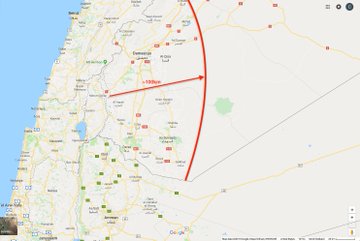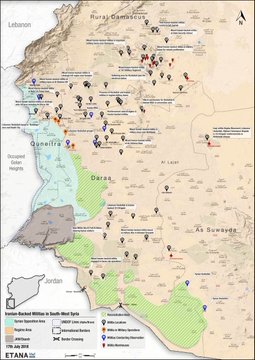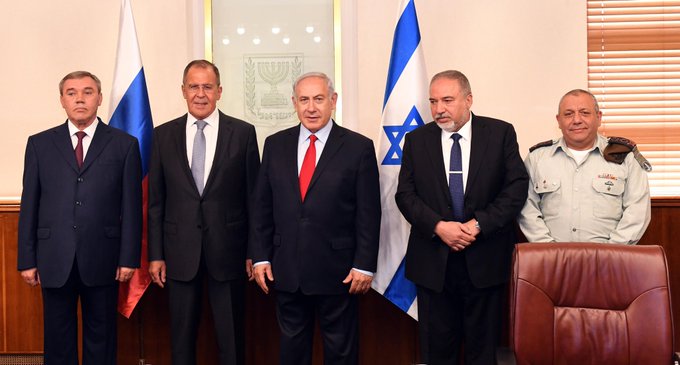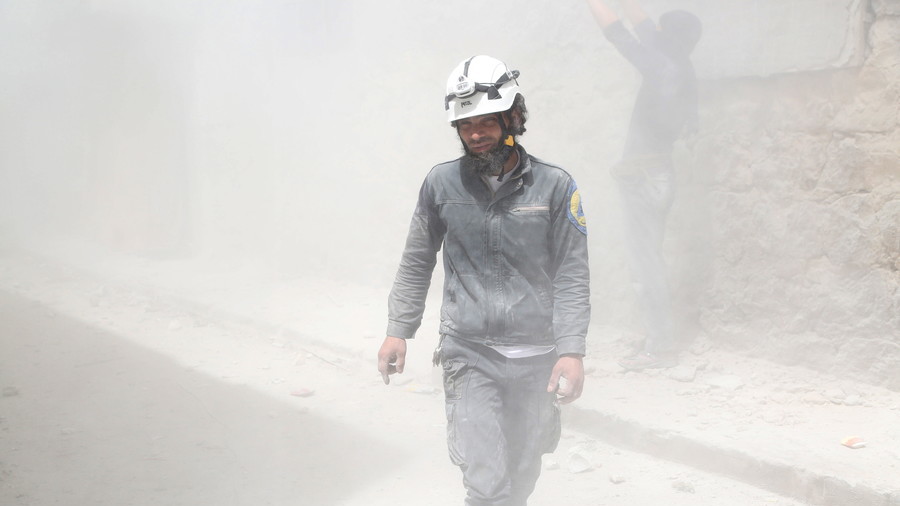Israel
Rejects Russian Plan To Keep Iranian Forces 100km From Golan Border
26
November, 2014
Israel
has rejected a Russian proposal to keep Iranian forces in Syria at
least 100 kilometers from the Syrian-Israeli recognized ceasefire
line along the Golan Heights, Reuters reports,
while Israeli leadership has further threatened to
hold Assad responsible "for any Iranian aggression".
According
to the breaking report, which cites
an unnamed Israeli official,
the issue came up during a meeting between Israeli Prime Minister
Benjamin Netanyahu and a visiting Russian delegation led by Russia’s
foreign minister, Sergei Lavrov:
The official said that Netanyahu told Lavrov "we will not allow the Iranians to establish themselves even 100 kilometres from the border."
And
crucially, the official paraphrased the following exchange
from the
closed door meeting:
"Netanyahu told Lavrov Israel will maintain freedom
of operation against Iranian entrenchment in all of Syria and will
see Assad responsible for any Iranian aggression against Israel from
Syrian territory because Assad is the one hosting the Iranians."
Monday's
urgent Israel-Russia meeting over Syria in Israel. Via Office of the
Prime Minister of Israel
FM
Lavrov is currently in Israel following a phone call between
Netanyahu and Putin last Friday wherein the two leaders agreed
that the Russian foreign minister and Russian army General
Valery Gerasimov would head to Tel Aviv for urgent talks over Syria.
According
to Israel's Channel
10 senior
diplomatic correspondent Barak Ravid, the
Israeli prime minister met with the Russian high level
delegation for over two hours while accompanied by Minister of
Defense Avigdor Lieberman and IDF chief of staff General Gadi
Aizenkot.
The
meeting reportedly included the Israeli side presenting the
Russians with maps
and intelligence reports purporting to show Iran's presence in areas
encroaching toward the border Golan border,
as well as locations in the rest of Syria.
Extraordinary.
Acc. to @BarakRavid sources, #Russia has told #Israel that it'll seek to force #Iran 100km away from #Israeli-held 1974 #Golan line.
That means all territory west of the red line on map (L).
= A truly wild fantasy.
Look where #Iran is now (R); per @ETANA_Syria:
According
to Ravid's
source: "The
Israeli official said Israel's goal is to get all Iranian and
pro-Iranian forces out of the entire Syrian territory but the
Russians want, in the first phase, to push the Iranians 65 miles from
the Israeli border."
The
Israeli unnamed official privy to the meeting said
further: "The
Russian proposal is fine, but eventually we need to get the Iranians
from Syria completely. Netanyahu told Lavrov Israel will not accept
Iranian military entrenchment – not in the areas near the border
with Israel and not in the rest of Syria."
Netanyahu
reportedly told Lavrov, as paraphrased by the source: Iran
needs to take all of its long range missiles and weapons out of
Syria, stop the production of precision munitions in Syria and take
all its air defense systems out of Syria.
Prime Minister Benjamin Netanyahu met this evening at the Prime Minister's Office with a Russian delegation led by Foreign Minister Sergei Lavrov and Chief of the General Staff of the Armed Forces Valery Gerasimov.
According
to Ravid,
"Netanyahu also demanded from Lavrov all border crossings
between Syria and Lebanon be monitored to prevent arms smuggling to
Hezbollah and border crossings between Iraq and Syria be
monitored to prevent infiltration of Shiite militias into Syria from
Iraq.
Iran needs to take all of its long range missiles and weapons out of Syria.
Iran needs to stop the production of precision munitions in Syria.
Iran needs to take all its air defense systems out of Syria.
The border crossings between Syria and Lebanon needs to be monitored to prevent arms smuggling to Hezbollah from Syria.
The border crossings between Iraq and Syria needs to be monitored to prevent infiltration of Shiite militias into Syria from Iraq.
Previously
on Sunday, the same day that an overnight evacuation of hundreds
of White
Helmets members and
their families by Israeli Defense Forces (IDF) took place at the
Golan border, Israeli jets carried
out a major airstrike on a Syrian government facility in northwest
Syria in Hama province,
reportedly a chemical weapons complex. a chemical weapons
complex.
Over
the weekend Netanyahu had warned in what's become a familiar
refrain throughout at least the past three years that Israel
is continuously acting against Iran’s military activities in
Syria: “We
will not stop taking action in Syria against Iran’s attempts to
establish a military presence there,” he
said in a prior statement.
Though
by many accounts the situation in Syria's south is stabilizing
as the government is fast
securing the border with Jordan after
a major offensive against FSA, al-Qaeda, and ISIS factions in the
region, the possibility for further clashes between Israel and
Damascus remains high, as we've previously
warned many times.
In
the past months there's been widespread reporting on a
"secret" deal brokered between Russia, Israel,
and Syria,
which reportedly
involves the
Syrian Army agreeing
to keep Iranian forces away from the ongoing campaign along
the Israeli and Jordanian borders, especially the contested Golan
Heights.
But
with today's breaking news of Israel's rejection of Russian
overtures, whatever tenuous deal that was possibly already in place
as part of a phased plan could now be officially off.
From
zionist sources
Putin’s top officials sent to Jerusalem after DEBKAfile disclosed his rift with Netanyahu. Israeli David’s Wand in first operation
Russian
Foreign Minister Sergei Lavrov and Chief of Staff Gen. Valery
Gerasimov were sent urgently to Israel on Monday, July 23 over the
Putin-Netanyahu rift that was exclusively disclosed by DEBKAfile.
Prime
Minister Binyamin Netanyahu announced the mission to the cabinet in
words that were revealing: He said Israel will not accept the Syrian
army’s entry to the buffer zone set up by the 1974 Syrian-Israeli
separation of forces accord, thereby indicating that he did not trust
in Syrian compliance with this accord, despite the guarantee offered
by President Vladimir Putin in their phone conversation on Friday,
July 20. DEBKAfile’s sources note that Putin’s pledge
came after he reneged on a series of promises he gave US President
Donald Trump and Netanyahu in recent weeks, relating to keeping the
Iranians and their proxies away from the Israeli border.
To
emphasize that Israel now meant business, the IDF was instructed
Monday morning to use the David’s Wand anti-missile weapon for its
first combat operation against Syrian missiles fired in a battle with
rebels in the buffer zone. Warning alerts were triggered the length
and breadth of northern Israel – from the Golan and the Bashan
north of the Sea of Galilee area up to Safed and Tiberias. David’s
Wand broadcast a signal to all those concerned that Israel had every
intention of using its most advanced weaponry in southern Syria if
necessary.
Three
important points emerged from Monday’s events:
- The claim that the Syrian army is fighting in the battles for conquering southern Syria is more fiction than fact: Aside from tattered elements of that army, the battles are being fought by Hizballah and pro-Iranian Shiite militias under Iranian command. So the “Syrian army” is a misnomer when referring to intrusions of the buffer zone, or proximity to Israel’s Golan border – currently estimated by military sources at no more than 3-8km. They should correctly be attributed to Iranian plus proxies.
- Some of these forces enjoy Russian air force support.
- If Israeli fighter jets are confirmed to have fired missiles from Lebanon Sunday night at a missile depot at Masyaf near Hama, killing Iranian and Hizballah officers, this raises a question: Why would Israel take military action against Iran and Hizballah far from its borders, while thus far holding back from attacking those same forces close to its Golan border? Indeed, Netanyahu threatened as much in his last conversation with Putin in the harshest terms: “Any hill captured by Iran and Hizballah near the Israeli border will become a crater,” he vowed. The Russian president seems to have taken this threat seriously enough to send his top people to Jerusalem to hold Israel back.






No comments:
Post a Comment
Note: only a member of this blog may post a comment.